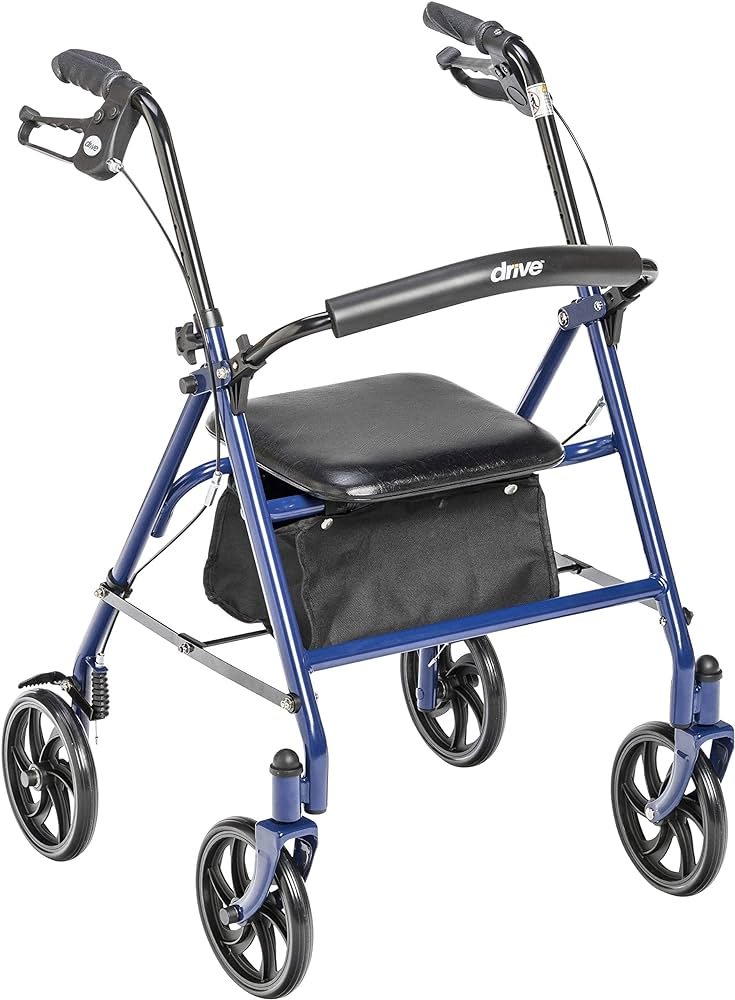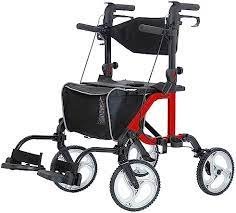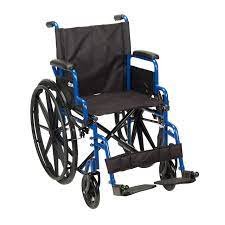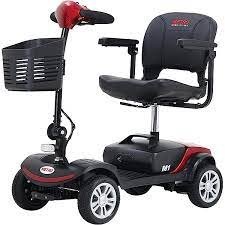Mobility Aids
Because POTS cases fall on spectrum, with some experiencing mild symptoms, some experiencing moderate symptoms, and some experiencing severe symptoms, there is a great deal of variability. Individuals with POTS can experience symptoms that vary in intensity and frequency, and this may change daily, weekly, or monthly. Using a mobility aid may make it possible for some to participate more fully in desired activities. Although we understand that this may not always be the case, we feel that mobility aids can increase the number of activities individuals with POTS may be able to participate in, potentially increasing their quality of life. Improving the quality of life for those living with POTS is extremely important to us.
Types Of Mobility Aids:
Rollators
Rollators are wheeled walkers with a seat. When looking for a rollator consider one with larger wheels for easier maneuverability outdoors, such as in parking lots.
Using a rollator allows for walking and then sitting when symptoms such as tachycardia, shortness of breath, and lightheadedness increase.
They can also help provide individuals with a place to sit while waiting in line for something, as symptoms can often be worse just standing.
Using a rollator allows for some exercise which is important for muscle mass and the role muscle pumps have in propelling blood back up the legs.
In some instances, only short distances can be traveled using a rollator, and a transport chair may be needed.
Transport Chairs
A transport chair is similar to a wheelchair, but it has smaller wheels and cannot be self-propelled, as it needs to be pushed by someone.
A transport chair is often helpful when going longer distances.
It may also be helpful to use a transfer chair when an individual is experiencing increased symptoms and is not able to walk even short distances.
While often lighter than a wheelchair, a transport chair works well indoors but is harder to push on varying terrain.
It may be helpful to discuss with your medical team if a transport chair is an important mobility aid for you to have access to.
Rollator/Transport Chairs
This a product that includes both a rollator and transport chair in one product.
This is a great option for many, as it allows for walking, when able, and walking varying distances.
It provides a sitting and resting option while also having the added benefit of transforming into a transport chair, allowing someone else to push the individual.
It may be nice for individuals with POTS to have both options in one mobility aid, providing them with more opportunities for comfort and mobility depending on how they are feeling.
Manual Wheelchairs
Those who experience severe POTS symptoms may need a manual wheelchair.
This can be self-propelled, when able, or pushed by someone else.
At times of lower symptoms, the wheelchair can be pushed by the individual with POTS, also providing them with a place to sit when they need a break.
Manual wheelchairs can vary in weight and cost, and some may find that they need lighter manual wheelchairs for traveling, and have heavier ones that they keep within their home.
Rollators, on average, weigh 12-15 lbs. Manual wheelchairs can weigh 15-50 lbs. It is important to consider the weight of each product and what you can safely manage. Another thing to consider is the space available in the vehicle you plan to transport it in.
Motorized Scooters
Motorized scooters allow for independent use, however these can be costly, require a ramp for maneuvering into minivans, and they are heavy.
These can be helpful options for independent use, especially when navigating more difficult symptoms in combination with fatigue.
We understand how helpful this option may be, especially if living alone and limited by the amount of help that is available, and it can also help individuals with more severe forms of POTS access a greater sense of autonomy.
It may be beneficial to consider various mobility aids by visiting a mobility aid store before purchasing so that the mobility aid can be tried/comfort level can be assessed.
Written by: Jennifer Dochod, MS OTR/L, Advisor





